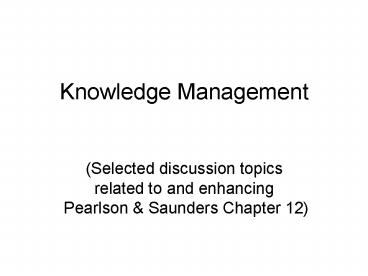Knowledge Management - PowerPoint PPT Presentation
1 / 18
Title:
Knowledge Management
Description:
A slightly deeper look into data, information, knowledge, ... 'Analytical competitors wring every last drop of value from business processes and key decisions. ... – PowerPoint PPT presentation
Number of Views:20
Avg rating:3.0/5.0
Title: Knowledge Management
1
Knowledge Management
- (Selected discussion topics related to and
enhancing Pearlson Saunders Chapter 12)
2
Our Three Discussion Goals
- A slightly deeper look into data, information,
knowledge, and wisdom - The latest in business use of the above
Competing on Analytics - The latest in Web use of the aboveThe Semantic
Web
3
Knowledge Management
- Processes necessary to generate, capture,
codify, and transfer knowledge across the
organization to achieve competitive advantage.
(p. 314) - Related concepts
- Knowledge bases, knowledge management . . .
- Intellectual capital
- Expertise
- Etc.
4
Lets look deeper into . . .
- Data
- Facts, observations (p. 315)
- Non-random symbols or signals
- Information
- Data endowed with relevance and purpose
- Data interpreted or processed to make it useful
for decision making - Detected non-random patterns in data
- To be useful it must have surprise value
(Many sources see work by Ackoff, Drucker,
Shannon . . .)
5
Examples Data versus Information
- What is a tell in poker?
- What is the data?
- What is the information?
- Customer loyalty cards
- Collect what?
- And can be used to generate what?
- That can then be used to do what?
6
Lets look deeper into . . .
- Knowledge
- Information human added value reflection,
synthesis, context, process, causality . . . (p.
315-316) - Explicit (easier to structure represent)
- Tacit (implicit, harder to structure represent)
- Organized, applied, operationalizable, storable,
shareable information - Whatever happened to expert systems?
7
Lets look deeper into . . .
- Wisdom
- Knowledge plus meta-knowledge
- Knowing whether/where knowledge applies
- Combining knowledge
- Extrapolating knowledge
- Recognizing and defining principles
- Applying values and value judgments
- Will we ever see wise IT?
Notice that we have been increasing the level of
understanding and added value as we move from
data to information to knowledge to wisdom.
8
Competing on Analytics
- Analytical management is impeded by
- Conventional wisdom
- Lack of rigor and dispassionate analysis
- Lack of people willing able to do analytical
work - The dominance of people over ideas
- Guess what? Theres actually evidence that
decisions based on analytics are more likely to
be correct than those based on intuition!
Davenport Harris, Competing on Analytics, HBS
Press, 2007
9
Example Netflix
- The Cinematch recommendation engine
- Contains over 1 billion reviews
- Throttling
- Favors the most profitable infrequent-use
customers - Competitive advantages keep coming
- Better decisions on distribution rightswhat to
pay, how many to license - Leverage knowledge as a bridge to inevitable
online distribution of movies
10
Business Intelligence and Analytics
- Optimization
- Predictive modeling
- Forecasting
- Statistical analysis
- Alerts
- Query/drill down
- Ad hoc reports
- Standard reports
- Whats the best that can happen?
- What will happen next?
- What if these trends continue?
- Why is this happening?
- What actions are needed?
- Where exactly is the problem?
- How many, how often, where?
- What happened?
Analytics
Competitive advantage
Access reporting
Degree of intelligence
11
Why Compete on Analytics?
- Business processes are among the last
differentiators - Analytical competitors wring every last drop of
value from business processes and key decisions. - There are now huge pools of data to draw on
- POS
- ERP
- RFID
12
More Examples
- Airline yield management (actually pre-dates many
modern analysis techniques) - Insurance companies using FICO scores
- Harrahs gaming loyalty cards
- UPS delivery routing (remember right turn only?)
- Amazon.com mass customization
- Even now used by (gasp) winemakers!
13
Four Pillars of Analytical Competition
- Distinctive capability
- Enterprise-wide analysis
- Senior management commitment
- Large-scale ambition
14
The Vision of the Semantic Web
- I have a dream for the Web in which computers
become capable of analyzing all the data on the
Web the content, links, and transactions
between people and computers. A Semantic Web,
which should make this possible, has yet to
emerge, but when it does, the day-to-day
mechanisms of trade, bureaucracy and our daily
lives will be handled by machines talking to
machines. The intelligent agents people have
touted for ages will finally materialize.
Tim Berners-Lee as quoted at http//en.wikipedia
.org/wiki/Semantic_web_note-5
15
What is a Semantic Web?(A Picture is Worth 1000
Words)
Current Web
Semantic Web
http//www.w3.org/2004/Talks/0120-semweb-umich/Ove
rview.html
16
Evolution of Markup
- HTML formatting of content (data)
- lth1gtThis is a level one headinglt/h1gt
- XML labeling of content (information)
- ltsymptomsgtRashlt/symptomsgt
- RDF (Resource Definition Framework) meaning and
relationships of content (knowledge) - ltthis presentationgt
- ltsubjectgt
- ltknowledge managementgt
- . . .
See the World Wide Web Consortiums Semantic Web
Activity Page http//www.w3.org/2001/sw/
17
Summary
- Knowledge is (competitive) power built upon data
and information and worthy of management
attention - Competing on Analytics attempts to exploit data,
information, and knowledge for business
competitive advantage - The Semantic Web attempts to extend the current
Web to incorporate knowledge and relationships
18
Something Fun and Relevant(Can you say why?)
- Google Image Labeler
- (Not always available to anyonesee
http//en.wikipedia.org/wiki/Google_Image_Labeler
for more information) - Can a CS Professor give an accessible and
interesting talk? - Watch http//video.google.com/videoplay?docid-824
6463980976635143 for at least 5 minutes and let
me know. (No, it wont be on the test.)































